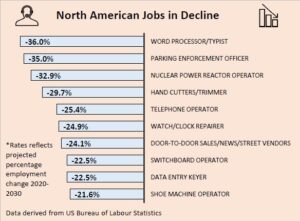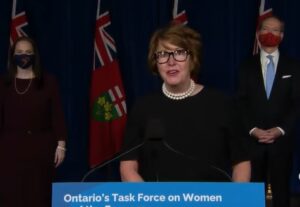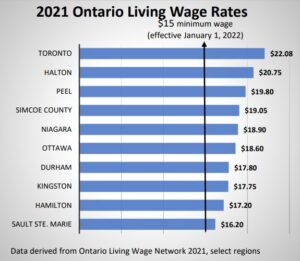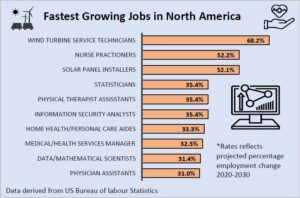The province has announced that effective January 1, 2022, the minimum wage will increase to $15 per hour. Currently, the rate is $14.35 per hour. Depending on where you live in Ontario, those earning minimum wage – the amount employers must pay by law – may not make enough to afford “living” in the community they call home.

The creation of new jobs is an essential part of a growing economy. In the wake of Covid-19, the job market remains in state of recovery. Its progress is largely dependent on the trajectory of the public health situation and emerging job trends.
While it is important to identify emerging trends that may positively impact economic growth, it is also essential to understand which jobs are in decline so as not to get stuck in a career that goes nowhere.
With the elections in the rear-view mirror, the focus for Canadians is on the path forward. Part of that includes a government working towards ending to the pandemic, improving affordability and sustainability while stepping up economic recovery efforts and creating better jobs.
The latest job numbers by Statistics Canada suggest Canada is on track. Data shows the economy added 90,200 jobs last month. →
Thanks to improvements in key health indicators, Ontario will move into Step 3 of the province’s reopening plan on Friday. That means the easing of Covid-19 restrictions for several public health and workplace measures including capacity limits for indoor/outdoor settings. It also opens opportunity for more Ontarians to return to work.
 Covid-19’s massive disruption to employment has had a significant impact on the economy. What is troubling is that women appear to be more affected by pandemic-related changes in the labour market than men. Ontario aims to change that.
Covid-19’s massive disruption to employment has had a significant impact on the economy. What is troubling is that women appear to be more affected by pandemic-related changes in the labour market than men. Ontario aims to change that.
On June 25, the provincial government announced new measures, through the creation of Ontario’s Task Force on Women and the Economy to help break down barriers women face in the economy.





